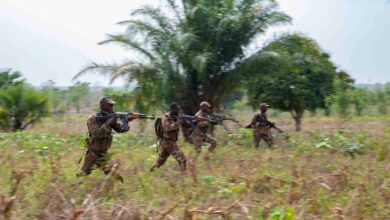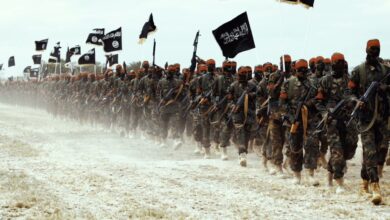US AFRICOM commander Townsend meets G5 Sahel leaders in inaugural trip
The new Commander of U.S. Africa Command General Stephen Townsend made his first trip as commander to the Sahel this week, meeting with the heads of the G5 Sahel joint force tasked with fighting insurgents in West Africa.
The Army general was to visit Mali, Burkina Faso and Niger during the trip this week, his first to the region since being confirmed as AFRICOM commander in April.
In Mali on Monday, Townsend met President Ibrahim Boubacar Keïta as well as leaders of the G5 Sahel Joint Force, the long-planned 4,500-strong joint counter-terrorism force comprising troops from Burkina Faso, Chad, Mali, Niger and Mauritania. Leadership included commander General Oumarou Namata from Niger, who assumed the role of commander in July, U.S. Africa Command spokesperson Samantha Reho told The Defense Post.
The trip allowed Townsend “to meet with Malian, Burkinabé, and Nigerien civic and military leadership to get a better understanding of defense and security-related issues in the region, and to ensure our future cooperation is understood and well-coordinated,” Reho said.
Townsend visited Burkina Faso on Tuesday where he met with President Roch Marc Christian Kaboré and several other Burkinabe and allied military leaders, AFRICOM said in a press release on Wednesday.
Meetings focused on building a comprehensive understanding of U.S. and partner nation activities in the Sahel, particularly in Burkina Faso, the release said.
The U.S. has extensive interests in Burkina Faso, and Burkinabe forces recently partnered with the Washington, D.C. National Guard as part of a comprehensive training program.
“We know the security challenges in Burkina Faso are significant and wide-ranging, but we are committed to helping them improve their capacity and security capabilities,” Townsend said Wednesday. “It is important for the U.S. to continue to support the international effort taking place in Burkina Faso while containing the spread of terrorism.”

G5 Sahel Joint Force challenges
Launched in 2017, the G5 Sahel counter-terrorism initiative has been undermined by lack of training, poor equipment and a shortage of funds.
In July, the European Union pledged an additional €138 million ($152 million) more to support the G5 Sahel Joint Force, including its police component, and United Nations Secretary-General Antonio Guterres has long-called for regular U.N. funding for the G5 Sahel.
The U.S. has pushed back against direct funding, preferring instead bilateral funding for individual states.
U.S. military funding to the G5 Sahel Joint Force provides training, equipment and advisory support, AFRICOM said on Tuesday. The command also provides bilateral assistance to the five member states for justice, military and law enforcement capacity-building.
AFRICOM has a liaison officer at the G5 Sahel force headquarters in Bamako, Mali “to ensure situational understanding and communication with the G5 Sahel Joint Force HQ staff,” Reho said.
“However, the majority of our security force assistance is through bilateral engagements with each of the participating countries,” she said.
At full operating capacity, the G5 Sahel force will have seven battalions spread over three zones, covering a strip of 50 km (30 miles) on each side of the countries’ borders. It is also expected that a counter-terrorism brigade will be deployed in northern Mali.
Insurgency in the Sahel
Townsend’s trip comes days after a special one-day meeting of the Economic Community of West African States (ECOWAS). The September 14 Extraordinary Summit on Counter-Terrorism meeting focused on the Sahel and the Lake Chad Basin and seeks to build on earlier discussions in Niger between stakeholders on terrorism and inter-communal clashes in the region.
ECOWAS leaders decided to mobilize “the financial resources of up to a billion dollars for the fight against terrorism,” Niger’s President Mahamadou Issoufou said after the meeting.
The money, paid into a common fund from 2020 to 2024, will help reinforce the military operations of the nations involved, and those of the joint military operations in the region.
Full details of the plan will be presented to the next ECOWAS summit in December.
“The security issue in the Sahel is a clear concern to the United States, and AFRICOM will continue to support the international effort to degrade the capabilities of violent extremist organizations in the region to execute violent attacks and to disrupt and neutralize their networks,” Reho said. “We view the G5 Sahel Joint Force as an important African-led initiative that can help restore peace and security in the Sahel.”
On September 11, the al-Qaeda Sahelien affiliate known as JNIM claimed a deadly attack in Mali near the Burkina Faso border targeting forces of the G5 Sahel. JNIM, a French acronym for Support Group for Islam and Muslims, said its fighters killed six gendarmes and captured weapons and ammunition in the attack.
JNIM had earlier warned the Burkina Faso government and those in the G5 Sahel group of states that attacks would continue while they cooperate with the France-led Operation Barkhane counter-terrorism force.
Two days before the summit, two soldiers were killed and five injured in two simultaneous nighttime attacks in Baraboulé and Nassoumbou in Burkina Faso’s northern Sahel region that borders Mali. JNIM claimed its fighters were responsible, and said that the attacks were a message to ECOWAS states ahead of their meeting.
JNIM is active in Mali and has carried out attacks in Niger. Operations in Burkina Faso are increasing and Ansar ul Islam, which emerged near the Mali border in December 2016, is also active.
Another significant threat to the region comes from Islamic State West Africa Province in Nigeria, Niger, Chad and Cameroon. Since May, Islamic State has attributed insurgent activities in the Mali-Burkina Faso-Niger tri-border area to its West Africa Province affiliate, rather than to what was previously known as Islamic State in the Greater Sahara.
Some ECOWAS members have also called for an international coalition to battle the insurgency in west Africa.
Niger’s President Mahamadou Issoufou at an African Union summit in July called for the creation of an “international coalition” modeled on the alliance that fought ISIS in Iraq and Syria.
Previously in May, Burkina Faso called for an international coalition to tackle terrorism in the Sahel.
There may also be trans-atlantic support for for a new initiative: the visit of Townsend, previously commander of Combined Joint Task Force – Operation Inherent Resolve, also comes ahead of an expected meeting this autumn where the U.S. is expected to seek additional contributions from the Global Coalition Against ISIS to combat the group and its affiliates in Africa.
Guterres again calls for UN to fund G5 Sahel counter-terrorism force












